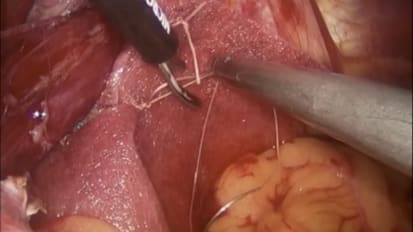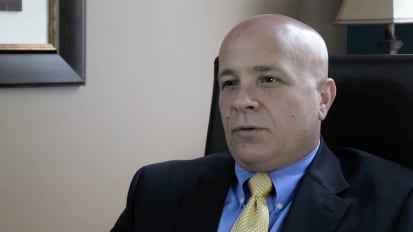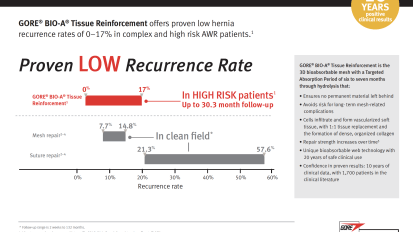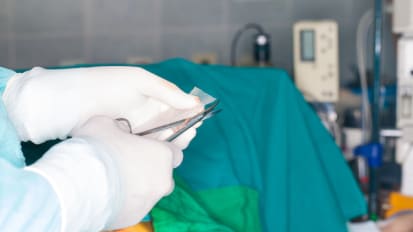
 Video
Video
GORE® SEAMGUARD® Bioabsorbable Staple Line Reinforcement
Professor Michel Gagner shares his experience working with GORE® SEAMGUARD® Bioabsorbable Staple Line Reinforcement. Video
Video
Retromuscular Hernia Repair Using GORE® SYNECOR Preperitoneal Biomaterial with Transfascial Suture Fixation
John P. Fischer, M.D., MPH, FACS, is a specialist in abdominal wall reconstruction. This is a surgical technique video demonstrating the retromuscular repair using GORE® SYNECOR Preperitoneal Biomaterial with transfascial fixation. Video
Video
Paraesophageal Hernia Repair Using GORE BIO-A Tissue Reinforcement
William S. Cobb, IV, M.D., FACS, shares a video showing paraesophageal hernia repair using GORE BIO-A tissue reinforcement. Document
Document
Better AWR Outcomes. Reinforced by Data. Critical healing period and repair strength
GORE® BIO-A® Tissue Reinforcement provides a unique 3D tissue-building scaffold that elicits a specific tissue response during the critical wound healing period. Video
Video
Laparoscopic Ventral Hernia Repair using GORE® SYNECOR® BioMaterial
Carl R. Doerhoff, MD, FACS, practices in SurgiCare in Jefferson City, Missouri, presents the use of the GORE® SYNECOR® BioMaterial Laparoscopic ventral hernia repair. Document
Document
Better AWR Outcomes. Reinforced by Data. Confidence for surgeons and patients in ventral hernia repair
GORE® BIO-A® Tissue Reinforcement is designed as an alternative to longer-term resorbable and permanent meshes to offer a strong repair while avoiding risk for long-term mesh-related complications Document
Document
Bioabsorbable Mesh for Hernia Repair: Know your Options
GORE® BIO-A® Tissue Reinforcement is intended for use in the reinforcement of soft tissue. GORE® BIO-A® Tissue Reinforcement may be used include hernia repair as suture-line reinforcement, muscle flap reinforcement, and general tissue reconstructions.Understanding Hernia Mesh Materials and Design, as Related to Clinical Needs
Join Howard Levinson, MD, FACS for a clinical discussion on hernia mesh, to understand materials and designs, and how those factors may relate to supporting clinical needs and patient outcomes. Video
Video
Minimally Invasive Surgery Symposium
Professor Michel Gagner discusses how to mitigate risks in bariatric surgery and reminds us that not all reinforcements are the same. Video
Video
A Hospital Administrator’s Perspective on Economic Value
Eric S. Bour, President, Hillcrest Memorial Hospital and Simpsonville Medical Campus, sits down to discuss how the value of a surgeon and a hospital are being measured today. Document
Document
Better AWR Outcomes. Reinforced by Data. GORE® BIO-A® Tissue Reinforcement offers low complication rates in complex and high-risk patients
GORE® BIO-A® Tissue Reinforcement offers proven low hernia recurrence rates of 0–17% in complex and high risk AWR patients. Video
Video
A Value Case Study Featuring GORE® BIO-A® Tissue Reinforcement for Hernia Repair
Learn how a US Midwestern medical center saved $340,000 with no change in quality outcomes* over 12 months when they switched to GORE® BIO-A® Tissue Reinforcement for complex hernia repairs. Learn why GORE® BIO-A® Tissue Reinforcement has proven outcomes and reduced costs for complex hernia repairs.